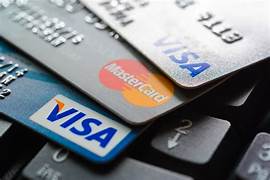

Warning *** Please consult with your local financial institution/advisor before acquiring any credit card
Random fact – the WWF used to make “The Million Dollar Man” Ted Dibease carry around fresh, crisp $100’s when he was on the road in order to make his wrestling gimmick more believable. Great Wrestling plots have always been about blurring lines between fact and fiction… and I digress.
You’re not here to read about wrasslin… you’re here at read about money. Today’s topic is – credit cards. 3 tips. Lets go!
Tip #1 – If You Are of Age to Have One, You Should Have One
Having a credit card helps you build credit. Credit is kind of like – a money novel. Starring you. You want to have some dialogue on the pages of the novel to make readers (in this analogy, the banks) feel comfortable with you. Having good credit is the financial worlds way of saying “he or she can be trusted with someone elses money”. The higher credit rating you have (the highest score in Canada is 900) – the more likely a bank will lend you money for something like a house (mortgage), a car, or something that’s so expensive that you probably can’t charge it on your debit card. If you want to read more about credit scores in Canada, click here. Or just like – download ChatGPT. Damn robots.
Tip #2 – Pay it Off Right Away
A credit card can be a good friend or a mortal enemy. A credit card is a good friend when you make purchases with it and pay off the full balance right away by transferring money from your checking (or savings) account to the card. By doing this, you can a) take advantage of your credit cards perks (some give you air miles/points that can be used for travel, groceries, etc) and b) increase your credit.
I won’t get too in-depth on why keeping a large balance on your credit card is not a good strategy. You’re just going to have to trust me when I say that using your card and then paying it off immediately is a tried, tested and true way to benefit you and not the banks.
Well AP, what if I want to buy my 19th pair of Lulu pants but I don’t have enough in my chequing account to pay off the balance of my credit card right away? Well soldier, you’re just going to have to do without the pants until you have enough $. Do you really need a 19th pair of Lulu pants? We both know the answer to that… and it’s not yes.


Tip #3 – Leave it @ Home When You ‘Go Out’
For folks who are later into their teens – going to a casino with the crew for the night? Leave the credit card at home. Bring a set amount of cash with you, and if you lose it, walk away.
Goin’ to the club for a dance? Leave the credit card at home. Because ‘starting a tab’ can lead to some horror stories.
In Summary….
A credit card is a necessary evil. Ever since online shopping became a thing, it’s becoming harder and harder to live without one. Try and book a trip on Expedia without a credit card, or check-in to a hotel. Or pay for your Netflix subscription. Hell, I can’t even buy a pesto chicken wrap on the plane without a credit card these days. Those are like – the worst $13 you’ll ever spend. They’re cold, and the lettuce tastes like its 9 months old. But you’re hungry and there’s no Chipotle 35,000 feet in the air. They got you by the short and curlies I tell ya.
BUT… there’s a catch. It’s a trap! Credit cards are fancy-looking loans. If your buddy told you that he was going to loan you $100, but if you didn’t pay any of it back in a month, you now owe him $120… would you think that’s a greasy move? You’re darn tootin ya would. This is how credit card companies make money. Interest. Fees. Penalties.
Credit card companies like Visa and Mastercard make billions of dollars annually because of one simple premise – people use credit cards to purchase things they cannot afford. People use their credit card like a second piggy bank. DO NOT DO THIS. Get a low limit card with no annual fee to start, and then graduate to a fancier card as your income (how much money you make) increases. But follow the 3 tips above, and you’re off to a good start.
Until Next Time
AP
Previous Articles on Money
Simple Money Tips for Teens Volume I – Click here
Simple Money Tips for Teens Volume II – Click here
